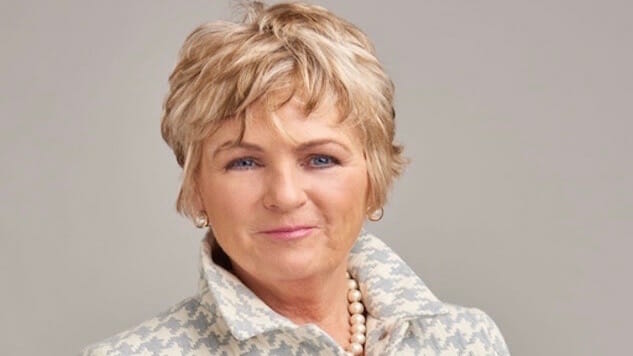Catherine M. O’Neill is not your typical playwright. The 58-year-old Dorchester, Massachusetts native was laid off from a prominent real estate development firm in Boston in 2009, a self-described “woman of a certain age with a mortgage and a lot of bills who suddenly had no job.” So, she says, she did the only thing she could think to do: “I went and got my MFA in playwriting.”
For O’Neill, it was an unfulfilled dream, one she always thought she wasn’t good enough to accomplish. But before she had even graduated, she had a contract signed to produce the first play she’d ever written, Soul Fight. “I’ve had what I believe is an unbelievable success as a fringe playwright in Boston,” she says. She’s been writing plays since 2011 and has now had six full-length productions of her work. “It’s hard to be a new old playwright,” laughs O’Neill, but her newest show, Sister Anonymous, is set to run March 3rd-March 18th at the Plaza Black Box Theatre at Boston Center For The Arts.
Sister Anonymous’ description piqued my interest: “What if the dynamic founding duo of the most successful self-help movement of the modern world, Alcoholics Anonymous, Dr. Bob and Bill Wilson, were compelled by an unrecognized third person? Sister Anonymous is her story.” As someone in recovery, I was intrigued: I’d never heard of Sister Mary Ignatia Gavin. “That’s exactly why I wrote the show,” O’Neill told me. Her last two shows have run to full houses and she’s hoping this latest show will be the same. We spoke on the phone about the play.
Paste: Can you tell me a bit about the show?
Catherine M. O’Neill: The play is the story of Sister Mary Ignatia Gavin. She was a Sister of Charity of Saint Augustine in Akron, Ohio. Really, when people think of the program of Alcoholics Anonymous, they think of two co-founders, Dr. Bob [Smith] and Bill Wilson. But the founding is based on a trinity, and the third was Sister Ignatia. It’s her story. So many of the traditions that happen in AA meetings, she initiated, [things like receiving medallions, providing coffee, and ending the meeting with the Lord’s Prayer]… And I boldly go on to suggest that she wrote most of [AA’s principal text], the Big Book. So it’s really the story of a woman who contributed to society in such a monumental way that has gone unrecognized.
Paste: How did the desire to writer Sister Anonymous come about?
O’Neill: I was doing research about AA and I read her name in a footnote. When I began researching, my thought was instantly that Bill Wilson and Dr. Bob did all they could so no one would know about her. But that wasn’t true. I believe it was society that never gave her the due she deserved for a lot of reasons but the main one being that she was an unmarried, childless women. Those kinds of women weren’t important for a long time, particularly a nun. In my research, I would find out that Sister Ignatia took the first drunk into a hospital setting. She hid them in the flower room of St. Thomas Hospital in Akron, before Dr. Bob even met Bill Wilson. So what you had at St. Thomas Hospital was a bunch of women, [nuns], that instinctively knew what to do. They couldn’t put terms on it like they do today, but they treated a drunkard with respect.
Paste: I have never seen this! Do you know what edition the footnote was in?
O’Neill: I’ve never been able to find the footnote again! It was a previous edition of the book, [which means it] has even been removed in the small place it was acknowledged. I went to Dr. Bob’s house in Akron for research. There is a movie that plays in the basement and she is mentioned in the movie. As part of my research, I watched every movie ever made about AA and she’s not in any of them, but she is in the one at Dr. Bob’s house.
Paste: You have a pretty impressive team of women behind you, too.
O’Neill: I didn’t set out to write a feminist play, but I have. It’s a play about a woman, by a woman, directed by a woman (Kelly Smith), starring women. It has a couple of men in it, but it’s really a tribute to women. A lot of playwrights today write issues-oriented plays. I can’t do that. My stories must come from an organic place. Even though they’re full of issues—my plays—that’s not how they start. Sister Anonymous is an example of that. I didn’t start this to write a feminist manifesto, but that’s what this is.
Paste: What else can you tell me about your work?
O’Neill: “I always think of myself as a playwright that creates work that neighborhood people come to. I always feel like, I’m born and raised in [the] Dorchester [neighborhood of Boston], and that’s who I write for. One of my greatest joys is when Dorchester people or neighborhood people come to my shows that have never been to a live show and they say, “I had no idea this was what theater’s about.” Theatre belongs to everybody. I don’t know when it became a place where it was just for certain people.”
Sister Anonymous runs March 3rd-March 18th at the Plaza Black Box Theatre at Boston Center For The Arts. Purchase tickets here.
